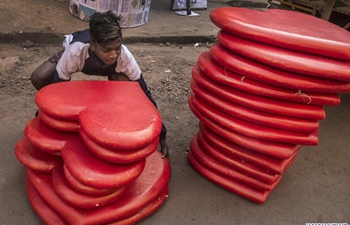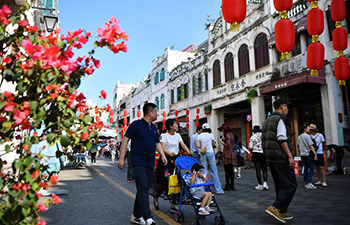NAROK, Kenya, Feb.12 (Xinhua) -- When Kenya enforced a ban on production and use of plastic carrier bags in August 2017, Daniel Kariuki, a hawker in northwestern town of Narok, had a dozen of the transparent plastic bags for packaging roasted groundnuts.
Seventeen months later, Kariuki has none of the bags as manufacturers have stopped producing them. Currently, he is using paper sachets that are often used in packaging medicines.
"Those plastic bags have disappeared from the market. I cannot find them," Kariuki told reporters.
"But these ones (paper bags) are more convenient as we don't need to seal them by burning the sides with a candle like we used to for the plastic ones. We explain to customers what is inside since they can't see through," said Kariuki.
He buys the paper sachets from chemists at 50 Kenyan shillings (0.5 U.S. dollars) for 100 pieces. He said although they are more expensive than the plastic bags, one can reuse them to light the charcoal stove.
"We would buy 100 pieces of 4 inch by 6 inch plastic bags at 0.4 dollars and you would see them littered everywhere but it is rare to see the paper bags thrown anyhow," said Kariuki.
Kariuki is among many Kenyan traders who have adopted innovative options of packaging their goods since the plastic ban came into force.
Green campaigners said the ban has been effective in eliminating pollution of vital ecosystems like water bodies.
"The environment is cleaner. The trees can breathe easy. No plastic is hanging on them," said James Wakibia, an environmental activist.
Although much progress has been made in advancing protection of environment through the shift to paper, sisal or fabric-made carrier bags, much still needs to be done to save inland and marine environments from single use plastics, said Wakibia.
For manufacturers, the plastic ban has nevertheless led to loss of investment and markets with some relocating their businesses to other countries, especially Uganda.
Phyllis Wakiaga, chief executive officer of Kenya Association of Manufacturers (KAM), said due to uncertainties in the policy regarding the plastic ban, many manufacturers in exports processing zones have been forced to outsource their packaging solutions from outside the country.
"This has led to the loss of the much needed backward and forward linkages in the manufacturing sector," she said.
Several companies have opened up operations to cater for the new business opportunities in secondary packaging and carrier bags with good progress being made in making fabric based bags, non-woven bags and pulp paper based bags, Wakiaga noted.
Wakiaga said KAM advocates for educating the general public and manufacturers on the importance of recycling and re-using bags.
She underscored the importance of establishing a circular economy that provides a parallel synergy to the current mainstream economic environment.
"This is a sure way of achieving industrialization and economic development sustainably without leaving behind the much important but often neglected social sustainability," said Wakiaga.
She emphasized the need for a holistic approach to waste management since it would lead to increased productivity as a result of efficient use of natural resources.













